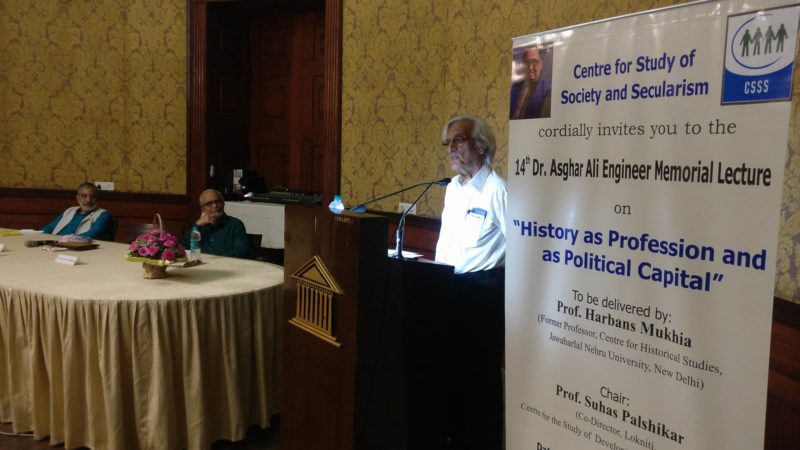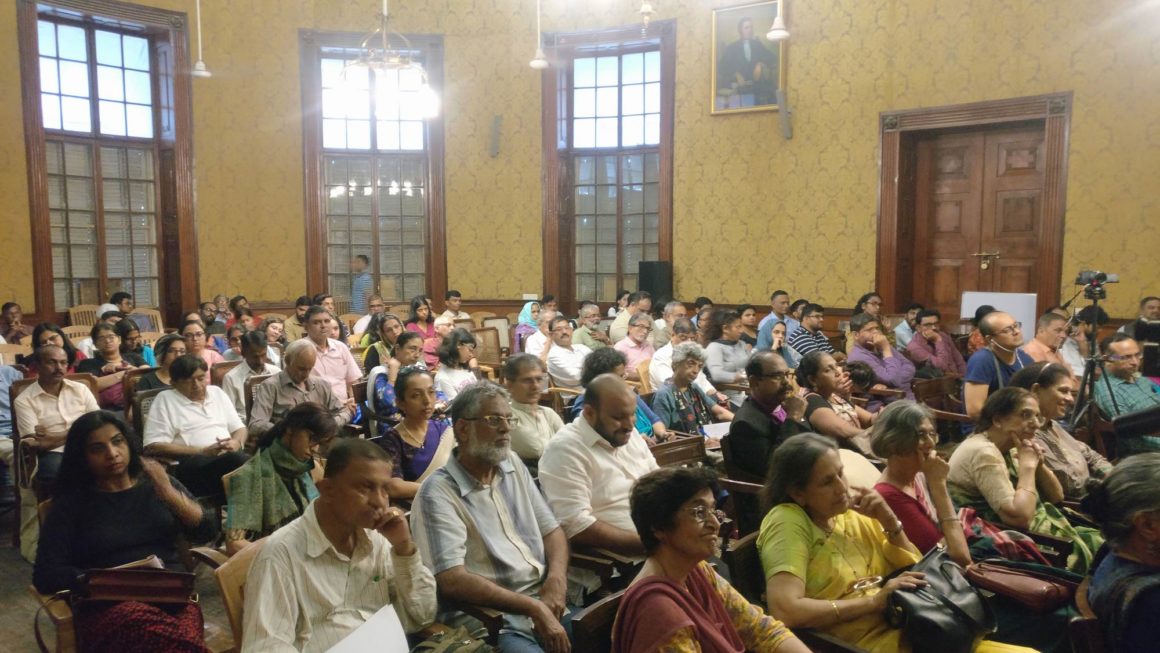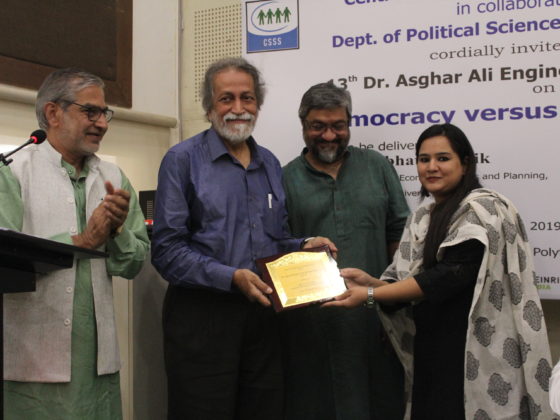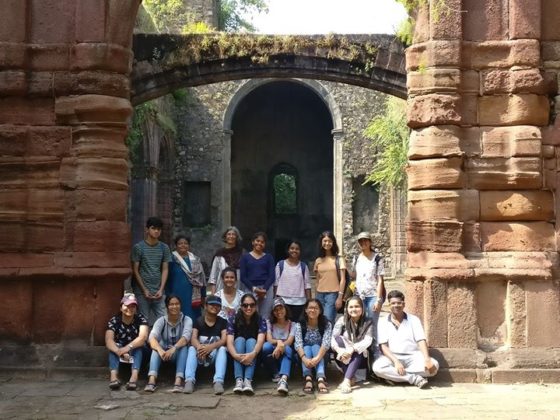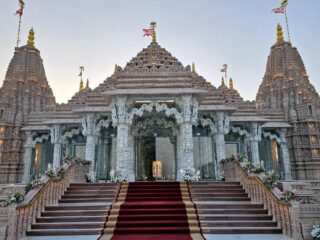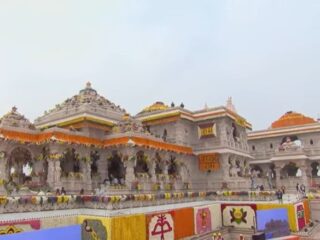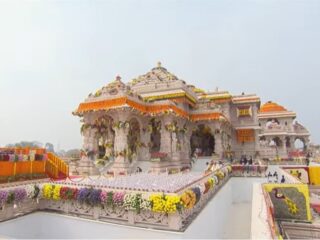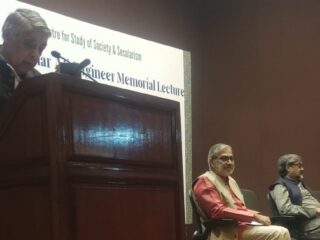Prof. Harbans Mukhia
Report of 14th Asghar Ali Engineer Memorial Lecture
By
R.Venkatesh
(Secular Perspective December 1-15, 2019)
Prof Harbans Mukhia chose a very relevant and engaging theme for his lecture on occasion of the 14th edition of the Dr. Asghar Ali Engineer memorial lectures – History as profession and as political capital.
He dealt with the complex theme of what is actually understood by the term history over the different phases of civilizational evolution, relating it with some key assumptions & defining objectives of those writing history through corresponding periods of societal evolution and political ideology. He followed it through succinctly with a deep dive into how history is used, misused and destroyed, in the objective to use it as political capital.
The talk highlighted several fundamentals of historiography:
Multiple channels: History comes to us from various agencies not just academics in schools and colleges; diverse inputs to all those who haven’t studied history, like popular history, through cinema, poetry, folklore, myths, theatre; history has several modes of percolation to society. Also, a kind of history is propagated in an organised manner as is done by organisations as RSS which is a practical approach to history as differentiated from an academic approach to history; the former is more political than the latterthough both come with an aspect of politics.History thus has much wider reach than what is taught in schools or colleges.
Evolutionary nature of history: Anoft asked question on what does history teach us is fallaciously answered commonly that history teaches us not to repeat mistakes, but in reality it does not serve that purpose, a lot of repetition of past mistakes like wars are regularly repeated. Insteadhistory teaches us how society evolves over time, and an important aspect is history writing also changes with time.
History as legitimizing factor: History in its practical and politicalapproach is used for legitimizing the powers that are writing a particular narrative. State, regimes legitimize their actions through use of history, but as a double edged sword, an alternative view of history can support the views opposing the regime as well.
Heterogeneity of history: Each of the practical, political uses have multiple strands, it is not monocultural and there are several factors and narratives either related or even opposing each other.
History, far from being a singular, linear narrative of fixed facts is in fact a complex narrative of diverse stories, narrated from several perspectives.
Evolution of history writing
Linear division of past time: Taking it forward with a cue to understanding the Europeanapproach that is still in some ways influencing history writing around the world, like dividing the history into Ancient, Medieval and Modern; between16th and at end of 17th centuryhistorical time was formally divided by European thought, and the European intellectual construct on history or way society was studied, permeated wherever their relations of power gave them the lead to do so, more so than their intellectual superiority.
Quest for truth: Going to antiquity, multiplicity of narratives was known even as early as Herodotus’ time (6th BCE) when he wrote “Histories”, by his definitiona narrative of tales and traditions, not a unitary whole, as to what happened and how it was narrated; at this stage concept of verification had not evolved., However an important perspective, in his approach wasawareness of delineation of truth and untruth, and the quest for truth and concept of “the truth” continues till well after. However, Truth in these narratives was subjective, not subject to verification.
From Rationality to Belief: There is a vague notion of past and present and change of Time, but no division of historic time into periods. Most explanations were rational in Antiquity.
From 4-5th centuries CE onwards, St Augustine as a writer of history brought about a key, explicit change bringing a concept of one history of whole of the universe, historical explanation being driven by God’s Will, Providence. God caused wars, peace, earthquakes and in God’s Will on His Omnipotence, everything is as per His Plan, unfolding itself. It was contrary to the Antiquity, and now led to uniformity of historical narrative. Priests were the main literate class and hence became historians. Their narration of Truth was proportionate to their publicly accepted honesty. History was designated Rhetoric.
Introduction of philology, study of changing meanings of words: Renaissance brought a new study of philology, study of words. It showed that the meanings of words also change with circumstance and time. He gave the example of recent political developments in Maharashtra government formation, where the word secularism changed meanings as per the political expediency of those who fought for the ruling position. The change of meaning of secularism to pitch for or oppose the formation of government changed with concrete change of political scenarios.
Study of Roman law was a concrete context in which words had changed over time. Now a clearer distinction emerged between three phases of historical time: Ancient, Medieval and Modern.
History based on empirical analysis: As critical evaluation of records began, two French historians of the 16th century, François Baudoin and Jean Bodin, divided sources into primary and secondary which was a key milestone in historiography, primary being contemporary to the events, and secondary being of later date. The speaker cited the example of the Supreme Court Judgment on Ayodhya as an illustration. The Babri Masjid constructed in 1528 by Babar’s general Mir Baqi makes no reference to an temple, much less a Ram temple standing on that site. Babur, Humayun, Akbar, down to Aurangzeb and their historians, despite their extensive documentation of their biographies, events and political happenings have not mentioned any temple at Ayodhya being broken and built upon with a mosque. Abul Fazl did mention Ayodhya to be of great vintage and the birthplace of Ram in the Treta age but makes no mention of either Ram temple or Babari Masjid. The first documented reference to Ram Janmasthan is dated to 1822 when the Superintendent of Faizabad judicial court mentions it but makes no reference to Ram Temple. This is a secondary evidence from nearly 3 centuries after the event and therefore of little value. But the Supreme Court went by evidence which is even later than 1822, which is a travesty of history.
By the late 17th-early 18thcentury, a giant step was introduced in history writing, to bring in footnotes citing bibliography, to authenticate the narrative. This followed the founding of archives, like familyrecords, Church records and then state archives, thus a significant move from concept of history asnarratives with no possible verification to a very explicit citation of reference, was achieved in history writing.
The quest was then for a comprehensive search for all facts and history as a collation of verified information. In 19th century Leopold von Ranke (German historian) established empiricism as key highlight of history writing as “history tells us as it really happened”. This was a shift away from historian to history as the source of empirical facts, the emphasis being on objective facts from reality and after a comprehensive collation, history would emerge as an objective set of narratives. “Telling” is an emphasis on reality of past, implying a unitary truth of view on past. Ranke professionalised academic history by way of establishing university chair for history.
Further the speaker explained why the Empiricism approach is not practically sustainable because history does get destroyed over time, thus a totally objective discovery ofevery fact in a manner of truthful representation is not possible. He elucidated that history does not really record objective facts as it were, but only as much as a writer is able to glean and interpret it factoring the multitude of truths which may be even at times contradictory to each other by way of interpretation. History has since then moved from a unitary narrative to plural narratives but bound by disciplinary requisites.
Islamic concept
Some historians believe organised history writing started with biographies of the Muhammad, the Caliphs, and later on of empires and dynasties as a means to record facts for posterity. Islam also gave a Hijri era which was common to Islamic world and a concept of world history, though restricted to Islamic world. Chronological sequence, years, dates were recorded meticulously, including using phrases with numeric values of Arabic script used intelligently to record dates. Authentication an event was made important. Isnad is another concept of tracing back a narrative from source origins and analyse variations in authenticity that Islamic writers were aware of. Islamic understanding of Beginning and End was akin to Christianity.
On Ancient Indian notions of history:
Marx , Hegel and several Europeans believed Ancient Indian notion was treating history with no real concept of time while they had only stories of dynasties but no history of society and its evolution.However as the speaker clarified Ancient Indian historiography was not centred on dynastues bur had a wider spread of the notions of the past. It was also seen by European and colonial thinkers that Indian time was cyclical not linear hence no progress. The speaker clarified that it was flawed thinking as concept of linear time as progressive was a later, post-Renaissance incorporation but was absent until then and that Islam also operated with linear time but had no notion of progress.
20th century historiographical perspectives:
The whole notion of Progress has now been challenged in context of colonial, European construct since the understanding of colonialism and its intellectual background is itself studied in great detail in present times. The view propounded by Ranke is also considered inadequate now, since it does not address the need for multiplicity of narratives or innate evolution of historical perspectives based on a society’s evolution. All history is in context of the present, thus knocking off concept of one explicit, single set of facts of the past. Annales school, and postmodern thought negates concept of one objective truth as against many truths all legitimately arrived at by empirical and interpretative study.
Modernity as a concept of gift of Europe is itself obsolete now, the speaker added. What is emphasized is the modern world we live in is the sum total of all civilizations of the past and not restricted to European legacy. Whether history of early coinage, trade, wheel usage, from early ages or philosophy or agricultural history, globalisation of trends of food consumption, all indicate the sheer diversity of impact of evolution of several civilizations of the past. He elaborated on this concept by giving example of the humble samosa whose shape and fried nature was central Asian but ingredients as potato, chilli or tomato all are from other parts of the world including Latin America. Hence the impact of other civilizations is very important in understanding evolution of societies studied. Plural versions of history become increasingly relevant.
He continued the thread citing that Marxist interpretation of singular factor of class dynamics and struggle being primary driver of historical evolution is open to scrutiny in face the of acknowledging several such simultaneous contributory facets to society’s evolution, past and present.
History as political capital also has several trends and is mobilized by both the state and its adversaries. Concept of division of historical time itselfAncient, Medieval and Modern implied rationality of modern vs the other two being less rational or irrational, designated as the Dark Age. This was a form of legitimizing Europe’s political presence in newly conquered regions. James Mill’s concept of Hindu, Muslim and British periods smacks of this bias against what he believed to be the Hindu and Muslim periods of Indian history, while the civilising objective of colonial empire was well legitimised by him in terms of bringing in the Modern age. In France, school syllabi would not speak of Algeria as a colony but being developed in fraternity not by dominance. Or in Pakistan textbooks highlighted Hindu injustice to Muslims bringing it to its present state, Japan’s views on Manchuria, all being glowing examples of regimes using a predefined narrative for a political purpose of legitimizing their acts, views and status.
History is also deployed to challenge the legitimacy espoused by the regime. India’s entire freedom struggle was driven by new versions of history of India’s past challenging the British imperial dominance of bringing progress and good governance to India. On a smaller scale, history of a region as against only a narrative of central, larger power is an assertion of the region’s identity. Similarly history of certain lower classes/castes for asserting their identities.
Thus history becomes medium of hegemony vs challenge to the hegemony, subjugationvs assertion of identity.
Destruction of history and establishing of historical fallacies: An important trend, that of deliberate destruction of history to replace it with a distorted, empirically false version is seen in current context, as is done by BJP to create an extremely negative view of Mughal history, especially Akbar who was equated by the party’s national spokesperson on a TV channel to be like Hitler without knowing the basics of either. Such a polar distortion for political legitimacy of communalism fundamentals was highlighted. Another major distortion and falsification was highlighted, that of mass conversion of thousands and thousands by force by Mughals, which is not borne by contemporary records or later census data. The Muslim population ratio in pre-Partition India, according to the 1941 census was just short of 25 percent. The demographic distribution of Muslim population in pre-partition India is highest in density in the subcontinent’s four peripheries, which were also medieval India’s political peripheries: Kashmir in the North, Malabar region of Kerala in the South, in what is now Pakistan and what is now Bangladesh. In the unchallenged Mughal heartland rarely the Muslim population was 15 percent at best. It makes nonsense of the theory that the huge masses of Muslims were converted by the Muslim state on the point of the sword; for it means that the State was exerting itself for it to the utmost where its power was the weakest and was lethargic in the region of its utmost and long held power, i.e. East Punjab, Delhi, UP, Bihar in this task. Mukhia cited Bishop Heber who mentioned in 1830s, that 1/6th populationwas Muslim and it rose to1/4th proportion by 1940s, an increase of 50 percent seen in the British period. It’s a fallacy and distortion of history. While acknowledging the reality of popular history, folklore and mythology as a key factor in developing perceptions of common popular history, he concluded the lecture urging the need for understanding the difference between verifiable narrative of past and a complete distortion.Considering that academic history only reaches 1 or 2 or at the most 5 per cent of population the risk of distorted narratives overriding history is a reality and calls for concerted effort to counter it.
The Q & A session was interesting and took forward audience interaction on understanding of the concept of changing historical perspectives.
Prof Suhas Palshikar in the chair, also complemented the views and concerns of the speaker, adding examples of how common perceptions of Ambedkar and Mahatma Gandhi have been changing due to organized replacement of public memory by creating new memories. For example, now Ambedkar is wrongly cited as having been uncomfortable with Islam, and the facts of working for marginalised by both these iconic figures is being systematically eroded. He also stressed that we must be careful about distinguishing distortion and falsehoods from historically verifiable narratives.
The program was attended by about 120 people from diverse fields such as history, sociology, activists and students. The iconic venue of Durbar Hall of Asiatic Society of Mumbai saw yet one more great exposition on evolution of society and its history.

